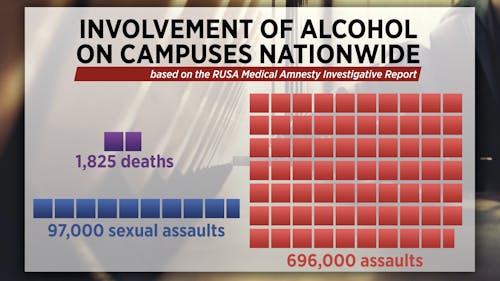Rutgers will no longer punish students who report overdoses

Rutgers students no longer need to be wary of calling for medical help if their friends are suffering from alcohol overdoses, as well as drug overdoses in cases of sexual assault.
At the University’s Board of Governors' last meeting, two amendments were made to the Code of Student Conduct, which allowed for medical amnesty to aid students suffering from alcohol overdoses. This means students accused of violating an alcohol or residence hall policy will appear before a committee rather than be punished by a single administrator.
If students drinking underage or under the influence of drugs in cases of sexual assault report a potentially dangerous situation, they will not be charged with a violation of the Rutgers University Code of Conduct.
Medical amnesty was first proposed last spring by a RUSA committee and approved in May by Vice Chancellor for Student Affairs Felicia McGinty, said Anne Newman, assistant vice chancellor for Student Affairs and Dean of students.
“When students are drinking underage or consuming drugs, and either themselves or one of their friends is suffering from alcohol poisoning we wanted them to not have to fear calling 9-1-1 for assistance without ... repercussions because we value their life more than getting them in trouble for drinking underage or consuming drugs,” said Justin Schulberg, RUSA president and a School of Arts and Sciences senior.
The RUSA committee first proposed medical amnesty because there was a gap between current state law and in actual University practice, Schulberg said. State law allows for medical amnesty, while in the past Rutgers did not.
Any changes to the Code of Student Conduct must be approved first by Barbara Lee, senior vice president for Academic Affairs, and then the Board of Governors.
Additionally, if students report any form of sexual violence and are under the influence of alcohol, the University will not charge them with misconduct related to alcohol or drugs while reporting the sexual violence, Schulberg said.
“We would prefer if students weren’t underage drinking or doing drugs at all, but being realistic about it, if that were to happen, we don’t want another student death on us,” he said.
In 2014, Caitlyn Kovacs, a Rutgers student, was pronounced dead moments after being taken to the Robert Wood Johnson Hospital Emergency Department. Following an autopsy, it was found that Kovacs died from acute ethanol toxicity.
A national survey found that alcohol is involved in the deaths of about 1,825 college students, 696,000 cases of assault, and 97,000 cases of sexual assault, according to the RUSA Medical Amnesty Investigative Report.
“We want people who are drinking, and if they engage in binge drinking, we want them to be able to call 911 as an instinct, not as some long drawn out conversation talking about what they should do," Schulberg said.
Some students say these amendments could be abused.
Celeste St. Clair, a School of Arts and Sciences sophomore, said it is beneficial for students to be able to report sexual crimes without fear, but she still has her reservations.
Students can accuse others falsely of sexual assault and tarnish their reputation, St. Clair said, adding that evidence should be presented.
Although it is possible, she hopes no one takes advantage of the amendment.
Roughly 5.9 percent of sexual assault cases were "provably false" at large universities, according to an analysis by the National Review.
There is uncertainty with the results because "44.9 percent of cases 'did not proceed' — meaning there was insufficient evidence, the accuser was uncooperative or the incident did not meet the legal standard of assault."
Creating amnesty for students may help encourage more victims to come forward, Schulberg said.
“We hope that more people will report sexual assault that they either witness or experience because of this policy,” he said. “We have a feeling that will be the reality, but only time will tell.”
The Code of Student Conduct was also amended to create a hearing option for students facing alcohol violations or residence hall policy violations.
The creation of a Community Standards Board gives students the opportunity to have their case heard before a group of students rather than just one administrator, Newman said.
“We believe this option provides students with another option in the student conduct process and provides more student engagement in the Office of Student Conduct,” she said.
Editor's Note: A previous version of this article suggested that the new medical amnesty policy affects all students who suffer from drug overdoses. The policy only includes drug overdoses in cases of sexual assault, not all cases.
Kayon Amos is a School of Arts and Sciences sophomore majoring in human resources. She is a contributing writer for The Daily Targum.



